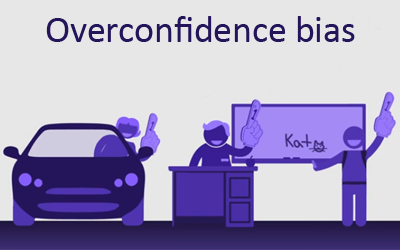It’s positive and healthy to feel good about our abilities and to believe in ourselves, especially when we have goals that we are striving to achieve. But there is a risk that our helpful confidence can become overconfidence, which can make us disregard real data or expert advice… and that can lead to costly mistakes and missed opportunities.
Overestimating our abilities and underestimating risks can also cause people to take ethical issues lightly. Did you know that when people are surveyed, they almost always believe they are more ethical than their competitors, co-workers, and peers? For example, they assume they will always do the right thing when they run into ethical challenges, but watch the following 1.5 minute video on Overconfidence Bias to see how that isn’t always the case.

What can we do about this tendency to be overconfident in our own abilities while also being more critical of the abilities of others? Consider the following:
- Take a moment to challenge your initial thoughts before coming to a conclusion. Act as your own devil’s advocate or pretend you’re giving advice to someone else.
- Actively seek feedback from colleagues, mentors, and other trusted sources. This can help identify blind spots and areas for improvement.
- Use objective measures, such as data or metrics, to evaluate your performance and make decisions.
- Imagine 5, 10, or 20 years into the future and think about how the decision will be viewed at that time.
We encourage personal learning about ethical topics and want to help you make them a regular part of your conversations. Consider using this video or registering for a class in UTLearn to generate discussions in your workplace about ways this topic applies to us at UT. There are additional videos about Business Ethics available on LinkedIn Learning and online through Ethics Unwrapped.
As members of the UT community, we are all expected to uphold our university’s core values through integrity, honesty, trust, fairness, and respect toward peers and community. If you are facing a dilemma, consider talking about it with a friend, a supervisor or manager, the Ombuds Office, or consult with us at University Risk and Compliance Services.
If you think someone is behaving unethically or illegally, contact the Compliance and Ethics Hotline online or by phone at 877-507-7321 (English) and 800-216-1288 (Español). Anonymous reporting is available. Remember that UT Austin prohibits retaliation against anyone who raises a concern in good faith.